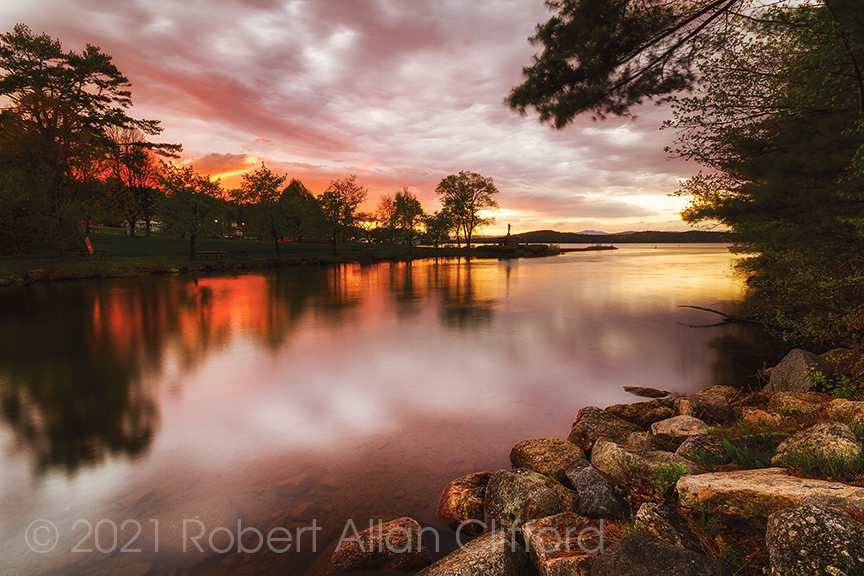An Antidote To High Pressure Living

PHOTO: “Weirs Channel Spring Sunset” Photograph by Robert Allan Clifford.
by Kenneth Ripley Forbes
Reprinted from “The New Hampshire Troubadour” – June, 1937.
I have lived for the past seven years on the edge of some of Connecticut’s most attractive countryside.
In a city of 60,000 people, it is remarkable how soon one can find himself in the midst of thoroughly rural territory. Ten miles from City Hall is true back-woods, with only the nearness of concrete roads to remind one of cities and towns. And to a considerable extent this is true of nearly all parts of the state; real country and large city, cheek by jowl, with no intervening suburban areas to taper off the sharp contrasts of scenery and mode of living. It fascinates and still almost surprises one who was brought up in a Massachusetts urban region.
But there is another striking thing about the Connecticut country that is equally surprising to anyone whose summers have been spent in mid-New Hampshire, – and that is the lack of distant outlooks and the feeling one gets that the country and the shore alike are shut in and away from the world at large. It is all a rolling countryside with few steep hills and no suggestions of the mountainous, even in the distance, while the shore line is completely shut in by the great bulk of Long Island on the east. There is no “stern and rock-bound coast” anywhere, no feeling of the infinite power of the open sea just beyond you that one gets along all the rest of the New England coast. And the sharp contrast of the great hills and valleys, with mountains soaring just beyond, that so dominates the sight and the feeling of the New Hampshire resident and visitor – all this totally lacking in the self-contained, reticent atmosphere of Connecticut. I find myself homesick for the high lights and deep shadows of New Hampshire’s vivid country and for the brilliant and stormy challenges of the open sea along her coast line.
The ever-increasing number of satiated city dwellers who pour into this countryside from the canyons and apartment-hives of New York – because Connecticut is so near and commuting so easy; I look on their elaborate houses along the shore and in the back-country with wonder and pity. They seem to feel that they have reached at last the haven of the honest-to-goodness country and the refreshing stimulus of the bona fide sea shore!
But the view from their country estates is, for the most part, nothing but the short expanse of a few low ridges and their ideas of forest land must be satisfied with the cut-over wood lots of second – and third-growth saplings! And these city migrants whose impressive houses spring up increasingly along this Connecticut shoreline – what do they know of the splendor of a first-class easterly storm as it sweeps in from the open sea?

They never see the coming and going of the solemn procession of the world’s shipping but a few miles distant from their doors, as so the more fortunate folk whose summer houses look out from the crag-lined coast in New Hampshire and Massachusetts. They are still a sheltered folk not far removed either in distance or in spirit from the oppressive tameness of the crowded metropolis!
And so as I think of my own modest summer home on an island in the midst of New Hampshire’s great Lake Winnipesaukee, where the outlook in every direction reveals the mountain peaks with their ever-changing colors — from the white brilliance of the snow in early May, through the green richness of mid-summer to the glory of the gold and scarlet flaming up into the sky through October, I rejoice that although it is not within commuting distance of my winter home, it is yet permitted to spend half the summer there and — thanks to the motorcar — to make three- and four-day trips at other seasons. I am convinced that no one really knows the recreating stimulus of the genuine high, as well as open, country until he has actually lived in northern New England.
It alone is the perfect antidote to the high-pressure life of our overgrown cities and the soul-corrective to the mass-production atmosphere in which such a large proportion of us professional and business folk live the most of our active lives today.
Philosophers tell us that contentment is two-thirds of life’s bounty. I do not know of a single city dweller who has obtained that state, but I know hundreds in the out-of-way places who have. Their names do not spangle our headlines, fresco our news reels nor do they decorate the ringside of The Colony, yet they have a complacency, a serenity wholly suburban. You never behold it in the city.
— O. O. Mclntyre in “New York Day by Day”
To see more of Robert Allan Clifford’s photographs go to robertallanclifford.com and Cliffordphotographynh.com



